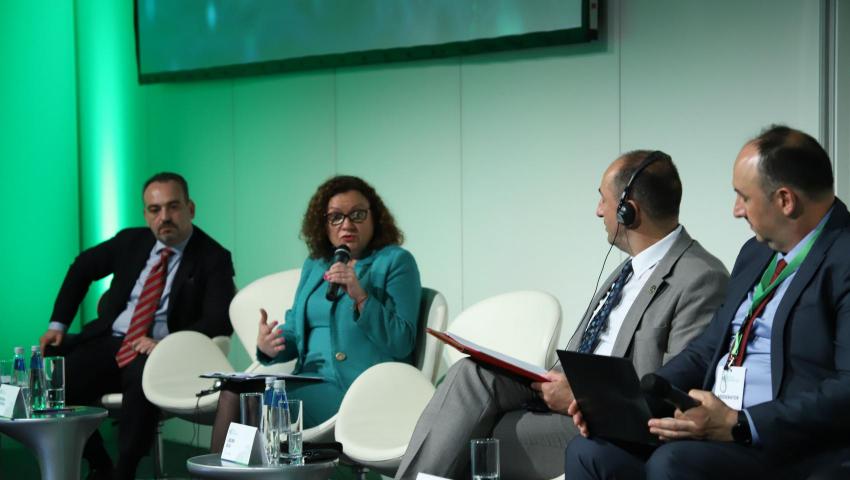Ivelina Vasileva: The state and municipalities fail to implement environmental policies quickly enough
In the next European Parliament, it will be even more difficult to lead green policies, MEP Petar Vitanov believes

Source: Ivan Kolovos / Dir.bg
The state and municipalities fail to maintain a sufficient pace to introduce measures for nature protection, recycling and circular economy. And besides the fact that we are late with the measures, municipalities and the state must already switch to the new economic model and use the incentives for introducing the circular economy. This was explained by the former Minister of Environment and Water during Green Week 2023 – the event that brought together a number of politicians, experts and defenders of green ideas in our country and in the region. According to Vasileva, the support that the state can give to municipalities and businesses in order to lead the right environmental policies is important at the moment. Vasileva reminded that our country is in one of the last places in terms of eco-innovations in Europe. The situation is the same with small and medium-sized enterprises, which put very little effort into innovation and development. Ecologically oriented companies are also very limited, because ecologically produced goods for the inhabitants mean something that is expensive in general, it became clear from Vasileva's words.
Waste is an essential part of the circular economy because it must be reduced. Resource efficiency is also an essential element. According to Vasileva, the benefits of the circular economy are extremely numerous. They are also economic, because new jobs will be created. Vasileva believes that there is a very serious potential in the use of recycled materials. There should also be a qualitative change in the design of the products, so as to allow their reuse and recycling, Vasileva pointed out. She added that it is important to provide institutional support to move to this new economic model.
However, moving in the direction of the circular economy requires several small steps that are not difficult to complete. Such are the centers for the repair of various products in populated areas, maintenance of e-platforms for trade of goods, green public procurement and efficient separate collection of waste. Incentives for limiting and recycling plastics, construction demolition, biomass and other basic raw materials are also important.
The Chairman of the Board of the Bulgarian Chamber of Commerce (BCC) Dobri Mitrev commented that a voluntary platform "Plastic Pact" was created, which is the first in the Balkans. The purpose of the platform is for the industry to reduce the number of packaging, as well as to increase their reuse. The circular economy is education, Mitrev pointed out. He believes that anything that will contribute to reducing waste and the carbon footprint should be fast-tracked into legislation. Mitrev again drew attention to the fact that it is 2023 and the business continues not to pay a fee for household waste based on the amount of waste. Also, the legislation in Bulgaria should not be sanction-oriented, but should provide incentives for recycling, circular economy and environmental protection.
On the topics of the circular economy, an action plan has been adopted in the European Parliament (EP), which includes many legislative initiatives. This was also said by MEP Petar Vitanov, who participated in the discussion. According to him, for a legislation to be sustainable, it must meet three components: environmental friendliness, competitiveness, and must be at a fair social cost. According to him, it will be extremely difficult for the next European Parliament to make any decisions related to green policies. The reason is that a number of countries have changed their governments, with right-wing and extreme policies prevailing. This led to the suspension of some green policies, and Sweden is an example in this regard, Vitanov added.
In the small Balkan country of Kosovo, they are trying to reduce their transport costs and make it greener. This was stated by the Minister of Environment, Territorial Planning and Infrastructure of the Republic of Kosovo, Liburn Aliu. The Government of Kosovo has placed emphasis on the implementation of the green agenda. By 2030, Kosovo must process a large part of household waste, the Kosovo minister explained. In addition, other types of waste will also be deposited. In this way, Kosovo is following the achievement of its green goals, Aliu pointed out. He also indicated that the goal is to build 1,300 megawatts of new wind power in the country by 2030. Kosovo also wants to reduce the use of water resources, Liburn Aliu added.
In Bulgaria, innovations in the sphere of the circular economy must be quickly introduced, believes the executive director of "Cleantech" (Cleantech Bulgaria) Mariyana Hamanova - a business network for sustainable development, working closely with public institutions, local government, business, academia and research and innovation organizations. According to her, solutions should be implemented easily and start with easily achievable goals. An SME can then think about new opportunities and green policies.
The event is organized by Dir.bg and 3E-news in partnership with Electrohold, Euroins, Eurohold, ProCredit Bank, Visa, Glavbolgarstroy Holding, Enery, Geotechmin, GCR, UBB, Artex Engineering AD, Telelink Business Services, TotalEnergy EP Bulgaria, Compass Cargo Airlines, Devnya Cement AD with ANRAV project, UniCredit Bulbank, MET Energy Trading Bulgaria, Dundee Precious Metals, FLAG Fund, European Investment Bank, Platform Brown to Green, TPP "Bobov Dol", Energeo, Bulgarian Development Bank, Electricity System Operator, Bulgartransgaz, Kärcher, ENplus®, Bulatom - Association, Solvay Sodi AD, "Big Data for the Benefit of the Intelligent Society" Institute (GATE), DEVIN, Bulgarian Federation of Industrial Energy Consumers (BFIEC), Kaufland.
Green Week 2023 is implemented with the media support of BNT, BTA, BNR, bTV Media Group, Darik Radio, Economic.bg, ESGnews.bg, Euronews.
